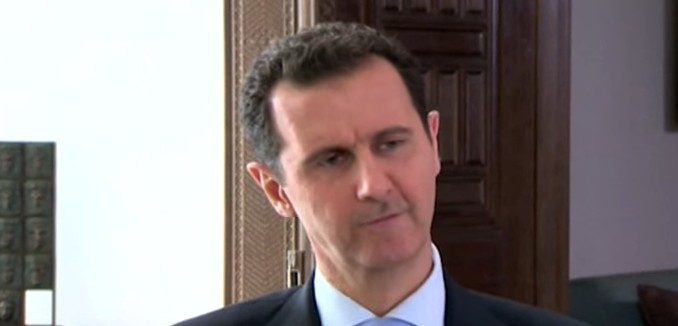Syrian dictator Bashar al-Assad was instrumental in engineering the rise of ISIS, and his continued support of the terror group makes him a poor ally in the fight against it, David Blair, the chief foreign correspondent of the Daily Telegraph, argued in an analysis published Monday.
Blair noted that in 2011 and 2012, during the early stages of the rebellion against Assad, the Syrian dictator released numerous Islamist prisoners from jail. A portion of these freed jihadists rose to become commanders of ISIS. With their assistance, ISIS captured oil fields in eastern Syria and then sold the oil to Assad, who effectively funded the terror group’s activities.
Despite the fact that ISIS controls significant portions of Syria, Blair wrote that a study by IHS Jane’s found that only six percent of Assad’s attacks targeted ISIS last year, with the vast majority of his military strikes hitting non-Islamist rebels and civilians.
Assad’s goal, according to Blair, is “to convince the West to accept him as an essential bulwark against the very threat he helped to conjure into being.” But, without Assad targeting Syrian Sunnis, moderates would be able to take up arms against ISIS, so “getting rid of Assad would be the key that unlocks a Sunni army to defeat the terrorists.”
Assad’s support for ISIS has been well-documented. Last month, U.S. Secretary of State John Kerry observed that “Assad has cut his own deal with Daesh.” Daesh is a derogatory Arabic term for ISIS. Kerry added, “They sell oil. He buys oil. They are symbiotic, not real enemies in this. And he has not, when he had a chance over four years, mounted his attacks against Daesh. The Daesh headquarters sat in Raqqa for years. It was never bombed by his bombs. It was children and women and hospitals and schools that were bombed by his bombs.”
Kerry previously emphasized this connection in December of last year, noting that “while Assad claims to be the last line of defense against a terrorist takeover in Syria, the truth is his relationship to Daesh has been symbiotic. It was Assad’s ruthless reign that fueled Daesh’s rise and enabled terrorists to portray themselves as the only alternative Syrians had to their dictator.”
In June, the administration charged Syria with bombing non-Islamist rebels while ignoring ISIS targets, which allowed the terror group to advance on the city of Aleppo in northern Syria.
Josh Rogin of Bloomberg View wrote last month that Assad’s strategy of bolstering ISIS to create a false choice between him and the terror group was working, and noted that the attention ISIS was receiving in the wake of the terror attacks in Paris was “taking the pressure off the Syrian regime right at the moment when pressure might have been effective.”
Assad’s chief backer, Iran, has also been implicated in facilitating the terror group’s ascension.
Last month, Reuel Marc Gerecht and Ray Takeyh wrote in Foreign Affairs that Iran has not attempted to roll back ISIS’s territorial gains, and observed that sectarian violence in Syria and Iraq allowed Tehran to achieve “more influence than at any time since the 1979 revolution.” By being seen as an indispensable partner in the fight against terrorism, they argued, Iran’s “cynical strategy…will likely do just enough to make sure the Sunnis don’t conquer the Shia portions of Iraq and Assad’s enclave in Syria, but no more. Meanwhile, in ISIS’ wake, Tehran will strengthen its own radical Shia militias.”
In May, former U.S. military intelligence officer Michael Pregent explained that Iran and its allied militias did not extend themselves to fight ISIS, and concluded that “Iran needs the threat of ISIS and Sunni jihadist groups to stay in Syria and Iraq in order to become further entrenched in Damascus and Baghdad.”
In Iran Is More Deeply Tied To ISIS Than You Think, which was published in the December 2015 issue of The Tower Magazine, Benjamin Decker detailed the heavy Iranian financial and material support that fueled the rise of al-Qaeda in Iraq, the predecessor to ISIS, and turned the group into a global terror threat.
Abu Musab al-Zarqawi and the rise of al-Qaeda in Iraq (AQI), the predecessor to the Islamic State, has been well documented; comparably little attention has been given to the group’s global reach. While the Islamic State was born out of Osama Bin Laden’s global jihad against the West, many overlook the importance of another player in the equation – Iran.
This may seem surprising given that Iran, the stalwart of the Shi’a Crescent, is currently embroiled in a regional war against the Islamic State in both Syria and Iraq. However, Iran’s Ministry of Intelligence and Security, described as one of the “largest and most dynamic intelligence agencies in the Middle East” by the Pentagon’s Irregular Warfare Support Program, has, over the past 20 years, provided financial, material, technological, and other support services to AQI. The man responsible for fostering this unexpected relationship was Imad Mughniyeh. While his name may not carry the same perceived significance as Osama Bin Laden, Mughniyeh commanded a vast international terror network that included Hezbollah, al-Qaeda, Hamas, and a myriad of others, spanning over five continents.
[Photo: BBC News / YouTube ]




